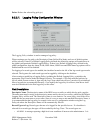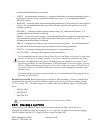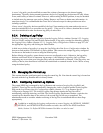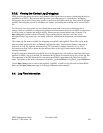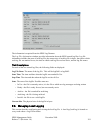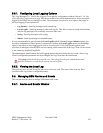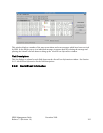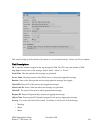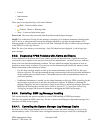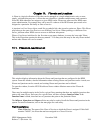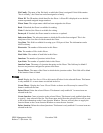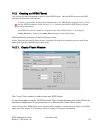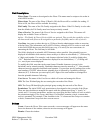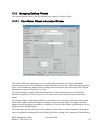
• Critical
• Indeterminate
• Cleared
These may be accompanied by a color status indicator:
• (Red) - Critical or Major alarm
• (Yellow) - Minor or Warning alarm
• None – Events and other alarm types
Error Code. The error code associated with the problem underlying the message.
MsgID. The 8-character ID code for this message, consisting of a 4-character mnenomic identifynig the
type of server or subsystem which issued the message followed by a 4-digit message number. (The
message number is not the same as the Error Code field.) Message IDs may be used to look up messages
in the HPSS Error Message Manual.
Text. The text of the alarm or event message. Only 240 characters are displayed. Look at log to get
entire message.
9.6.3. Diagnosing HPSS Problems with Alarms and Events
Events displayed on the Alarms and Events window provide an indication that a significant event has
occurred in a server and the event may be of interest to the administrator. An alarm, however, indicates
that a server has detected an abnormal condition. The user should investigate the problem as soon as
possible to ensure timely resolution. The user may use the information provided by the alarm to obtain
further information on the problem as follows:
• Use the alarm message number to look up the alarm information in the HPSS Error Messages
Reference Manual. For each documented message, the manual provides more detailed information
on the problem and its possible source. The manual also provides recommendations on how to
resolve the problem.
• If additional information is needed, use the alarm timestamp to delog the HPSS central log for the
log messages received prior to and after the problem is reported. In addition to obtaining the
messages logged by the server in question, it may be necessary to obtain log messages from other
HPSS servers that interface with the server. Refer to Section 9.3.2: Viewing the Central Log
(Delogging) on page 300 for more information on delogging the HPSS log messages.
9.6.4. Controlling SSM Log Message Handling
This section describes the options available to control SSM handling of HPSS log messages.
This does not include the SSM session log. See the -S option on the hpssgui or hpssadm man page for a
discussion of SSM session logging.
9.6.4.1. Controlling the System Manager Log Message Cache
By default, the SSM System Manager stores the alarms, events, and status messages it receives in an
internal memory cache. This cache can be configured instead to be kept in a disk file by defining the
HPSS Management Guide November 2009
Release 7.3 (Revision 1.0) 305



